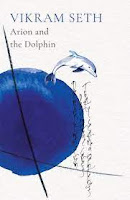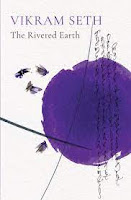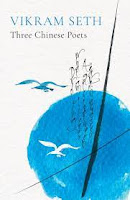What
sets Vikram Seth’s poetry apart is its craft. He uses forms of poetry that have
fallen by the wayside, exploring the 14 line sonnets and clinging to rhyme and
metre persistently at a time when most poets prefer free verse for its lack of
responsibility and its gravitas. Seth’s poetry has about it a cheerful kind of
confidence blending old form with new voice, bringing in every day things like
cups of coffee and cookies that no one would really have considered to be the
stuff of poetry. Even when he is serious, he manages to be light about it.
Former
lovers haunt the pages as do memories. This poetry collective brought together
by Speaking Tiger includes Mappings (1981), The Humble Administrator's Garden (1983), All You Who Sleep Tonight (1990), Beastly Tales From Here and There (1991), Three Chinese Poets (1992) and the libretto Arion and the Dolphin (1994). These seven
slim volumes have showcase the
breadth of Seth’s genius and the recurring designs in his work, a kind of
lyrical leitmotif. The cover designs by the Alphales are embellished with the globe
motif that is so much a part of Chinese culture, whether lantern or sun disk, accentuated
by calligraphy and flights of natural fantasy from the poems, each in a
different shade with a slight positional shift. The whole reflects the
favourite preoccupations of Seth’s work and making this a collector’s series
indeed.Anjana Basu
The
publication of this as the world waits for A
Suitable Girl is a chance to reflect on what we know of Seth’s well loved
poetry.
Vikram Seth’s first book of poems, Mappings, was written in his twenties, during his student life in England and California. As young poets do, he wrote about love, life and the scenes that passed before his eyes with intimacy, immediacy and inventiveness, though yes, these are the works of a poet in the making with nascent qualities of what we can read in the later Seth. Four translations of poems by Du Fu (Chinese), Faiz Ahmed Faiz (Urdu), Heinrich Heine (German) and Suryakant Tripathi Nirala (Hindi) are included in this collection of otherwise original work.
The
Humble Administrator’s Garden, his second collection of poems, refers to a garden in
Suzhou, China, one of the most famous of its kind, a tranquil space created by
a retired official for reflection. Using the garden as his inspiration, Vikram
Seth mulls over the three traditions he knows best: India, California and
China. His verses muse over Chinese noblemen and hermits; lost or deserted
loves; the night with its moonlight, loved by Chinese poets and California
lovers alike, touched by the crash of waves and gentle hush of water not to
mention musical echoes. Nature rules with the emotions of the night and a touch
of melody as Vikram Seth translates three T’ang dynasty poets—Wang Wei
(699–761 AD), Li Bai (701–762 AD) and Du Fu (712–770 AD)—who have the power to
move the world with their meditative lyricism. Seth chose them because of their
very different responses to the times that they shared, weaving together what
lies within with what surrounded them and erasing the difference of twelve
hundred years with emotion and understanding. Quiet, humble and graceful, the
collection has been given a cover to match.
It was obvious that a writer like Seth, who loves music, would write words that would eventually be sung. Arion and the Dolphin, was produced by English National Opera in 1994 (and subsequently in Rotterdam, Singapore and Nottingham).
The retelling of a Greek legend about a dolphin which
rescues arid befriends Arion, a young court musician, after he's tossed
overboard by jealous shipmates who are determined that he will not compete in a
Sicillian talent show, was set to music by Alec Roth. The opera was produced
by the English National Opera, coming on the wings of A Suitable Boy and has
nine scenes.
Though
Rivered Earth came much later, it
fits into Seth’s operatic mode. The
four libretti set to music by Alec Roth echo much of Seth’s other poetry and
brings together the influences that characterise his work – Chinese,
Californian, spanning centuries, bridging time and space. The first three
poems, entitled ‘Songs in Time of War’, ‘Shared Ground’ and ‘The Traveller’,
are about places that Seth has encountered in the course of his poetic
journey—China during the T’ang dynasty and the Administrator’s Garden, the
English house of Metaphysical poet George Herbert, and India, Seth’s birthplace
and a place to which he occasionally returns. The fourth libretto, ‘Seven
Elements’, brings together the elements of this rivered earth in a combination
that melds ageing and mortality.
All You Who Sleep Tonight is a collection that brings together lost
loves, musings from Chinese poets and Quatrains and is the one most poetry
lovers cite as their favourite. The title poem is the most beautiful but the
sense of loss and longing lingers through the pages. Vikram Seth sifts through the many shades of love—lost, remembered, and
deferred. He dons other voices like that of the poet Mirza Ghalib after the
mutiny; a German commander at Auschwitz; a Japanese doctor in Hiroshima after
the bombing, thoughts too painful perhaps to be shared in his own. He takes us
through other places, landscapes that he loves, sunlight filtering through the
early morning in landscape in Garhwal; the Lion Grove in Suzhou with its fabled
gardens and across his old poetic love the Golden Gate Bridge as he hails its
fiftieth anniversary.
All in all this collection refreshes Vikram Seth’s work in a
series that is bound to adorn shelves across the country.
Anjana Basu works as an advertising consultant in Calcutta. She has had a book of short stories published by Orient Longman, India, the BBC has broadcast one of her short stories. Her poems have appeared in Kunapipi, The Antigonish Review. The Edinburgh Review and The Saltzburg Review to name a few. Her byline has appeared in Outlook. She has 10 novels to her credit and 2 collections of poetry.





No comments :
Post a Comment
We welcome your comments related to the article and the topic being discussed. We expect the comments to be courteous, and respectful of the author and other commenters. Setu reserves the right to moderate, remove or reject comments that contain foul language, insult, hatred, personal information or indicate bad intention. The views expressed in comments reflect those of the commenter, not the official views of the Setu editorial board. प्रकाशित रचना से सम्बंधित शालीन सम्वाद का स्वागत है।